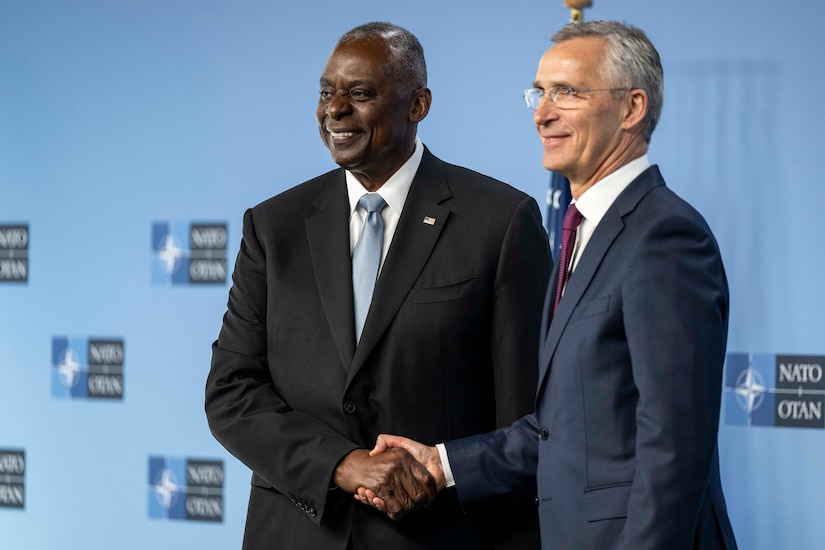Secretary of Defense Lloyd J. Austin III underscored NATO’s enduring commitment to Ukraine after meeting with his alliance counterparts in Brussels today.
The leaders discussed Ukraine during a meeting of NATO defense ministers, marking the final round of high-level talks before next month’s NATO summit in Washington.
“Like nations of goodwill around the world, our NATO allies continue to stand up for Ukraine’s sovereignty and self-defense,” Austin said. “And as we prepare for the Washington summit, the NATO-Ukraine partnership continues to deepen.”
Today’s meeting included discussions on the alliance’s defense and deterrence initiatives, including progress toward meeting capability requirements for NATO’s new generation of regional defense plans.
The defense ministers also discussed defense industrial production to ensure delivery of key capabilities to Ukraine and NATO’s plan for training Ukraine’s defenders.
Following the discussions, NATO Secretary General Jens Stoltenberg said the group has agreed to a plan on how NATO will lead future coordination of security assistance and training for Ukraine’s armed forces.
The effort will involve nearly 700 NATO personnel and partner countries, who will oversee training for Ukrainian armed forces at facilities in allied countries. The alliance will also plan and coordinate security assistance for Ukraine, manage the transfer and repair of equipment and support the long-term development of Ukraine’s armed forces.
“These efforts do not make NATO party to the conflict,” Stoltenberg said. “But they will enhance our support to Ukraine to uphold its right to self-defense.”
NATO leaders will formally launch the effort during next month’s summit.
Ahead of today’s meeting, Austin hosted the 23rd iteration of the Ukraine Defense Contact Group, a U.S.-led coalition of some 50 countries committed to helping Ukraine defend itself from Russian aggression.
As he met with members of the coalition on Thursday, Austin underscored the group’s collective commitment to helping Ukraine meet its urgent defense needs and bolster its long-term security amid what he said is a critical moment in Russia’s ongoing war of aggression.
“Ladies and gentlemen, this is a critical moment,” Austin said as he kicked off Thursday’s discussions. “The stakes of this war are high. Ukraine’s survival is on the line. But so is all of our security.
“None of us would want to live in a world where [Russian President Vladimir] Putin prevails,” he said. “And we would all be less secure if tyrants think that they can trample borders and cow their neighbors.”
Today, Stoltenberg also previewed a new defense industry pledge that will be formalized at next month’s summit.
The pledge, which is aimed at sending a sustainable demand signal to industry, will allow the alliance to “scale up production and to develop a defense industrial base that’s fit for purpose,” Stoltenberg said.
Austin said investment in the defense industrial base “is crucial to the future of our alliance.”
The defense ministers also discussed the ongoing adaption of NATO’s nuclear capabilities and made further progress translating regional defense plans into concrete requirements and identifying the forces needed to defend the alliance.
“For 75 years, NATO has been the greatest defensive alliance in human history,” Austin said today. “NATO has prevented conflict, maintained freedom and the rule of law, and upheld the principles of democracy and human rights.
“We still have more work to do together,” he said. “And as we look toward the summit in Washington and beyond, I am confident that we will continue to make the United States and our world more secure.”









